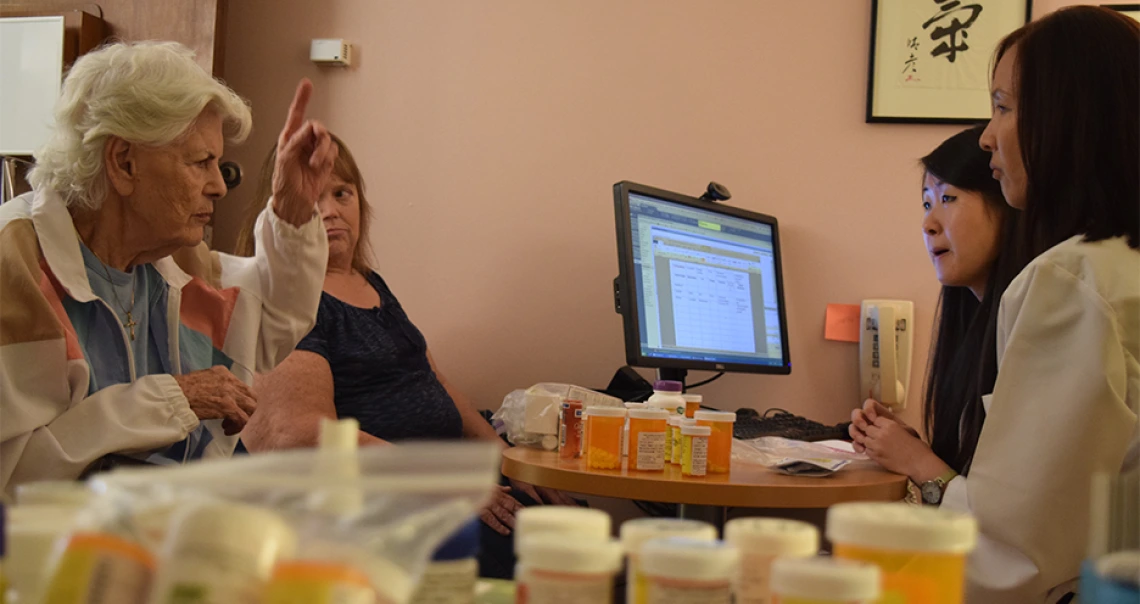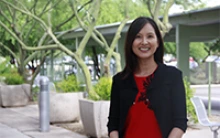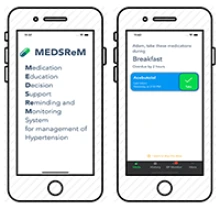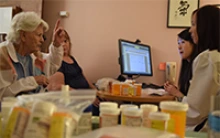Meds Mobile App from UArizona Health Sciences to Provide Greater Autonomy for Older Adults with Hypertension
As more older adults use smartphones, College of Pharmacy researcher Dr. Jeannie Lee hopes to improve medication adherence and blood pressure rates with a management system in the palm of their hand.

TUCSON, Ariz. – Despite known benefits of taking prescription medications on time and with regularity, estimates indicate about half are not taken, leading to increased health care costs and mortality.

Jeannie Lee, PharmD, who specializes in geriatrics and behavioral research at the UArizona College of Pharmacy, hopes a new mobile app she and colleagues are developing will help improve patients ability to keep track of the many medications they are prescribed, particularly for blood pressure. (Photo: University of Arizona College of Pharmacy)
With new federal funding, however, a team of researchers from the University of Arizona Health Sciences and other academic collaborators will seek to improve medication adherance rates in older adults with a novel mobile application.
With an interprofessional team comprised of experts in pharmacy, nursing, educational psychology and cognitive aging, UArizona College of Pharmacy’s Jeannie Lee, PharmD, BCPS, BCGP, will use a five-year, $3.09 million grant from the National Institutes of Health (NIH) to advance and test the Medication Education, Decision Support, Reminding, and Monitoring System 2.0 (MEDSReM-2), an integrated mobile app and companion website. The MEDSReM-2 system will support medication adherance for hypertension and blood pressure (BP) management for older adults. While not yet publicly available, it is available to the research team and will be further developed and tested with study patients before commercial marketing.

The homescreen (left) for the MEDSReM medication adherence mobile app and an example of how the app notifies a patient (right) that they may have missed a scheduled time for them to take their medication. Click to enlarge. (Image: University of Arizona College of Pharmacy)
Hypertension, or high blood pressure, is the most prevalent chronic disease among older Americans, estimated to affect 67% of people age 60 or older, according to the U.S. Centers for Disease Control and Prevention. BP medications are remarkably effective in reducing negative outcomes of uncontrolled hypertension and proper adherence to blood pressure medications can yield major reductions in heart failure and stroke, as well as preserve cognitive function.
“Though medications are very effective for hypertension control, the typical hypertension medication adherence rate is only about 50%, and hypertension control in older adults is only 53%,” explained Dr. Lee, the college’s assistant dean of student services and an associate professor who specializes in geriatrics and behavioral research. “Proof that medications do not work if people fail to use them.”
In a previous research project led by Kathleen C. “Kathie” Insel, PhD, RN, chair of the Biobehavioral Health Division in the UArizona College of Nursing, Dr. Lee and fellow collaborators developed and field-tested the first iteration of the MEDSReM app. This initial app was a technology translation of the Multifaceted Prospective Memory Intervention (MPMI), a series of strategies seeking to increase medication adherence by supporting cognitive processes.

UArizona College of Pharmacy’s Jeannie Lee, PharmD (far right), participates in a medication review appointment with an elderly woman and her daughter-in-law. The average number of prescription drugs filled annually increases from 13 for ages 50-64 to 20 for ages 65-79 and 22 for those above age 80, according to a University of Georgetown health policy study. (Photo: University of Arizona Health Sciences, David Mogollon)
Co-principal investigators on the MEDSReM-2 study, Dr. Lee and Wendy Rogers, PhD, the Khan Professor of Applied Health Sciences at the University of Illinois Urbana-Champaign, as well as Dr. Insel and other collaborators now have started to use the grant to build on the original MEDSReM app, which integrates the successes of the MPMI strategies into a single, easy-to-use mobile app. If the technology proves to be useful, they plan to expand the next iteration for other diseases and populations.
The MEDSReM-2 app will capitalize on technological advancements such as integration of a wireless blood pressure monitor to provide feedback on the relationship between a person’s adherence rates and their blood pressure. In addition, the app will enable the smartphone camera to provide an easy set-up for entering medications, supporting missed-dose decisions, and personalizing their reminder schedule. The MEDSReM-2 system will also include a web portal to provide educational materials and feedback visualizations. Through this multidimensional approach, the research team believes patient medication adherence rates will be sustained and BP levels improved.
Other collaborators on the NIH grant include: Dan Morrow, PhD, and Tim Hale, PhD, professors at the University of Illinois Urbana-Champaign; Tracy Mitzner, PhD, senior research scientist at the Georgia Institute of Technology; and Josephine D. Korchmaros, PhD, director, UArizona Southwest Institute for Research on Women.
Research reported in this publication was supported by the National Institute of Nursing Research, a unit of the NIH, under Award No. R01NR018469.
# # #
A version of this article also appears on the UArizona College of Pharmacy website.
NOTE: Photos available here – https://arizona.box.com/s/wpwyu437ak8nh4t5sxcywzwxndn3cxxv.
About the University of Arizona College of Pharmacy
The University of Arizona College of Pharmacy is the premier pharmacy college in the Southwest, and one of the top in the nation, focused on drug discovery, toxicology, pharmaceutics, health outcomes and sciences, pharmaceutical education and research through interprofessional training and collaborative public/private partnerships. Preparing pharmacists and pharmaceutical scientists in undergraduate, professional, graduate and post-doctoral programs, the college embraces an entrepreneurial spirit, providing tailored educational opportunities to broaden students' experiences. Established 72 years ago as the first health sciences college at UArizona, the college has a long history of improving science and health, both in Arizona and around the world. It is currently ranked No. 8 among the nation’s 143 colleges of pharmacy by the American Association of Colleges of Pharmacy. For more information: pharmacy.arizona.edu (Follow us: Facebook | Twitter | Instagram | YouTube).
About the University of Arizona Health Sciences
The University of Arizona Health Sciences is the statewide leader in biomedical research and health professions training. UArizona Health Sciences includes the Colleges of Medicine (Tucson and Phoenix), Nursing, Pharmacy, and the Mel and Enid Zuckerman College of Public Health, with main campus locations in Tucson and the Phoenix Biomedical Campus in downtown Phoenix. From these vantage points, Health Sciences reaches across the state of Arizona, the greater Southwest and around the world to provide next-generation education, research and outreach. A major economic engine, Health Sciences employs nearly 5,000 people, has approximately 4,000 students and 900 faculty members, and garners $200 million in research grants and contracts annually. For more information: uahs.arizona.edu (Follow us: Facebook | Twitter | YouTube | LinkedIn | Instagram).

